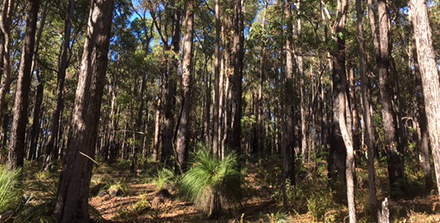
Regrowth jarrah forest south-east of Perth. This forest is ear-marked to be strip-mined for bauxite.
Western Australia will soon become one of the first States in Australia to end commercial logging of native forests. Source: Timberbiz
From next year, timber will only be taken from WA’s native forests to maintain forest health and for approved mine site operations.
The State Government says its historic decision to end the “unsustainable practice” in the Forest Management Plan 2024-33 will protect nearly two million hectares of native karri, jarrah and wandoo forests for future generations.
WA’s iconic karri forests were predominately being chipped and exported overseas while jarrah sawlog products were mostly sent interstate.
The government says it is investing $350 million in WA’s softwood pine plantations.
“This move by the Cook Government will safeguard our ionic forests for generations to come,” Forestry Minister Jackie Jarvis said.
“The record $350 million investment in WA’s plantation estate will ensure we can continue to build houses in WA, supporting both the local construction industry and the South West forestry industry.
“As a leading manufacturer of building products in WA, Laminex and businesses like eKitchens in Forrestdale have an important role to play in shaping the future of the building sector by utilising sustainable wood products.”
The government says that pine from softwood timber plantations is extensively used in the construction of WA homes. Additionally, it says the pine trees capture carbon dioxide from the atmosphere, helping to fight climate change.
The government says this investment will create an additional 140 timber industry jobs in the South West, protect existing jobs in the industry, and support thousands of jobs in the State’s construction sector that depend upon a reliable supply of softwood timber.
Following the move to end commercial native forest logging, the government committed to an $80 million Native Forest Transition Plan that included significant industry restructure payments, which have now been made to all eligible sawmills.
Millions of dollars have been made available through various grants, for community development projects that stimulate the local economy, create sustainable jobs and attract new industries.
The government says that most importantly, these grants will assist workers and families impacted by the end of commercial native forest logging.
The funding also aims to transform former timber towns into thriving places to live and visit.







